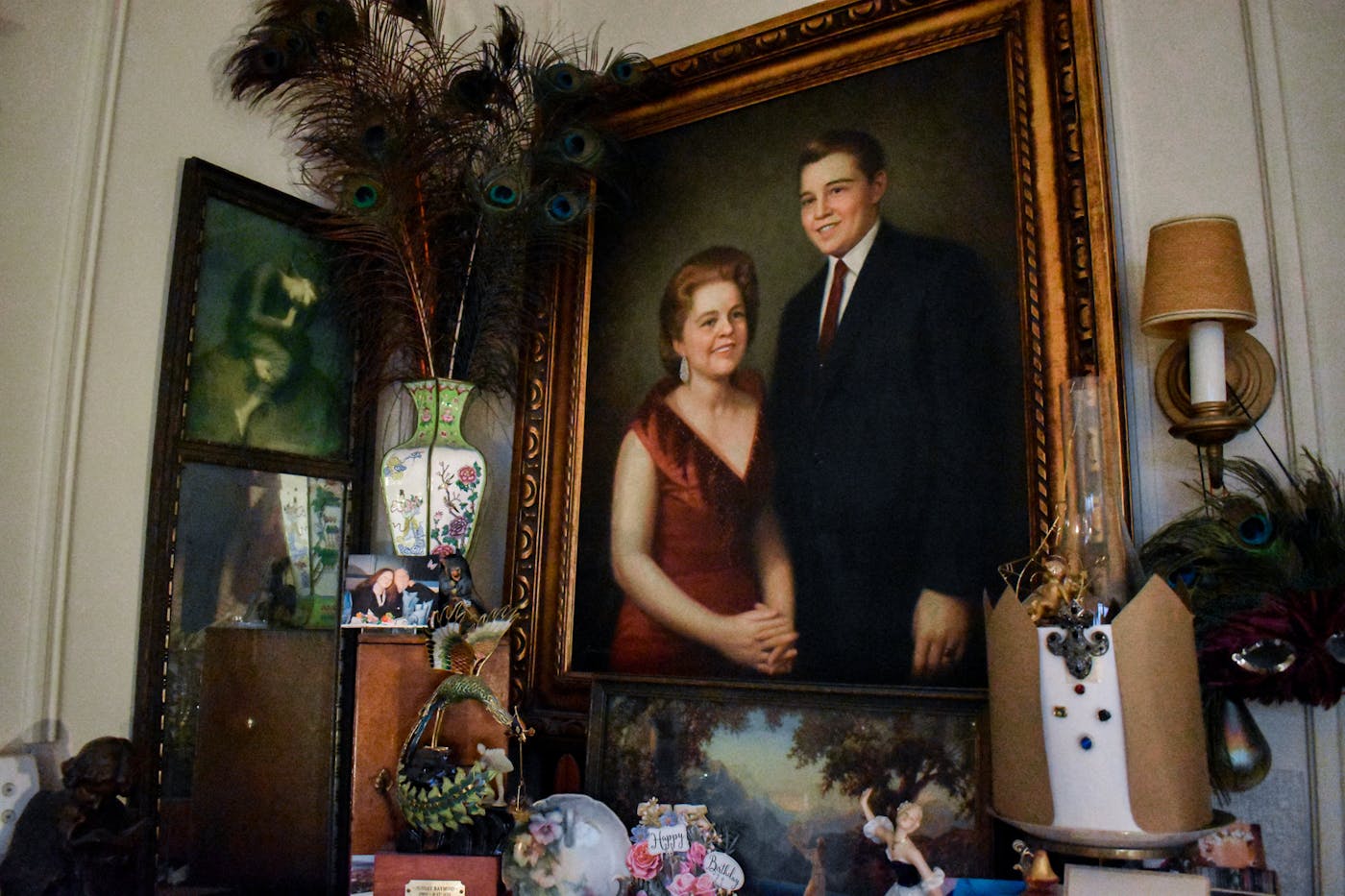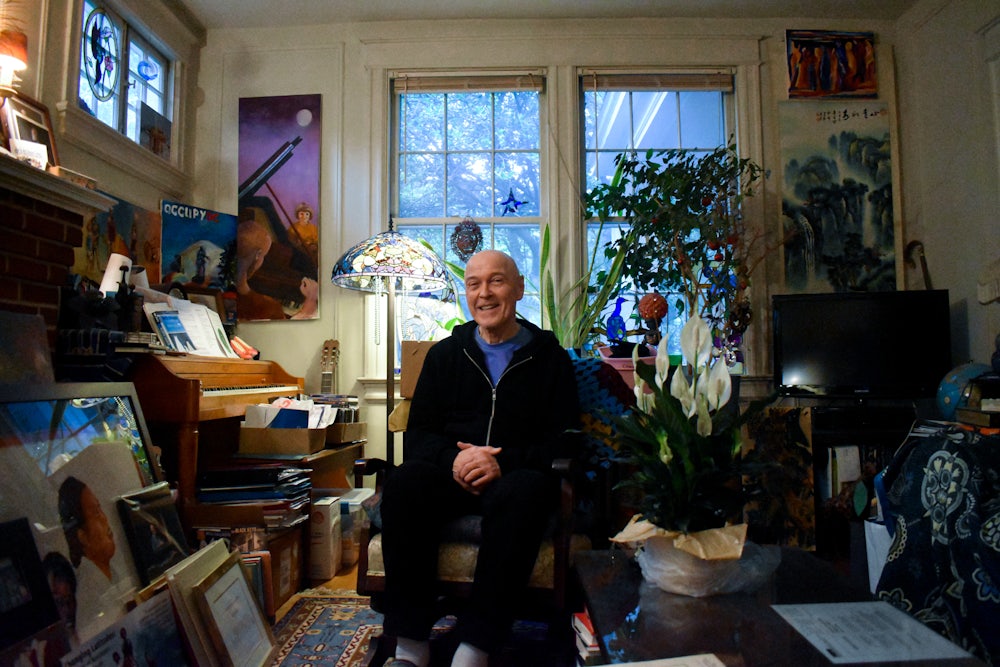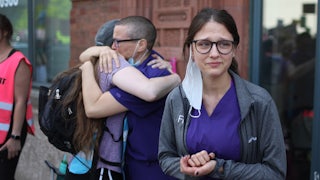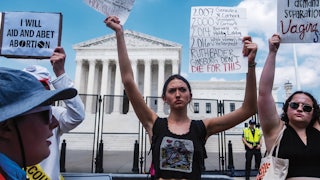Gary Raymond and his mother, Elizabeth, usually wouldn’t sit down at the table for breakfast. It was 1963; he was in seventh grade and usually just grabbed something quick before rushing off to class. When his mom suggested they take a seat, Gary knew that something was wrong.
His father, Sherwin, hadn’t come home last night, his mother began, and then handed him the morning copy of their local Bergen Record. “I remember unfolding that and seeing a picture of my father on the front page, top of the front page,” Gary said almost six decades later, now a retired social worker who lives in Washington, D.C. “She said he’d been arrested for performing abortions.” He had no idea what an abortion was.
His mother, who hadn’t yet spoken to her husband since the arrest, began to describe abortion to her son—detailing it as something that women needed, something that was difficult and necessary. Elizabeth spoke of her mother, who had given herself an abortion (via gasoline or turpentine, Gary can’t quite remember now), and of her grandmother, his great-grandmother, who had an abortion too.
“The emotion that’s coming up for me” he told me, holding back tears, “is really about how hard it must have been for my mother to have to sit down with her young son and explain this to him, when she had not a lot of time to process this already.”
Gary, now 71, is part of a dwindling group whose parents were arrested, charged, and incarcerated for performing abortions in a pre-Roe world. His experience growing up at the center of a national debate around abortion provides a window into another group of children, one that’s just now emerging in a post-Roe world, whose parents are risking their lives and livelihood to keep providing abortions for pregnant people.
In Arizona, a century-and-a-half-old law mandating prison time for abortion providers could be put into effect. In Texas, under the trigger ban Governor Greg Abbott signed in June, doctors could face life in prison or $100,000 in fines if they perform abortions. And in Mississippi, the home of the case that brought down Roe v. Wade, a doctor performing (or even attempting) an abortion could be charged with a felony offense and up to 10 years in prison. The criminalization of doctors who provide often lifesaving, life-affirming care to pregnant people leaves their children in the crosshairs, forced to bear the collateral damage of a system that wants to at best harass and at worst lock up their parents.
Sherwin Raymond was a lot of things: a doctor, veteran, lauded debate-team member, boxer, and hard-ass; and an emotionally distant, pro-woman, pro-gun, Jewish, atheist, short and sturdy, force-to-be-reckoned-with man.
Sherwin described himself as a “rebel” and loved to tell stories of beating up those who bullied him as a kid. During college, a newspaper article noted that “behind the outward countenance of a lamb,” Sherwin showed “the courage of a lion.” In the 1960s, when he was repeatedly arrested for performing abortions throughout New York and New Jersey, Dr. Raymond was still making headlines, yet this time instead of “Mighty Mite,” they read, “4 Held in Riverside Drive Raid as Members of Abortion Ring”—public damnations thrown on the porches of Raymond’s neighbors for years.
At the time, the police blotter treated abortion care as a serious crime, a scandal: Men ran abortion mills that preyed on innocent women and insulted society, the church, and America’s morality; doctors’ and nurses’ names and addresses were printed, leaving them open to harassment; and providers encountered real consequences, both legal and social. If you were a known abortionist, you could face anything from having your practice disgraced to spending years in prison.
“What I recall about those years,” Gary said, “was that he would get arrested, there would be the newspaper article, the shame, but he would get out on bail.” This pattern became routine. Law enforcement would try to catch Sherwin, but the women who got abortions couldn’t be identified or wouldn’t show up to court, and the charges would be dropped. That allowed him to keep his medical license, and he’d continue providing abortions. One night, however, broke this cycle.
The evening featured the kind of abnormal plan that was painfully normal for women trying to get an abortion before it was ruled a constitutional guarantee. These women, no older than their early twenties, were told to meet someone at an address in Newark at midnight, then make sure another someone picked them up at the same location three hours later. Oh, and bring $600 cash.
Either by tip or by coincidence, when their ride came to pick up the women postabortion, the police were waiting. What ensued was a year of uncertainty for the Raymonds, culminating in an eventual trial now memorialized in over 600 pages of transcripts on Gary’s kitchen table. The transcripts illuminate another pre-Roe reality: The women who Sherwin saw that evening were treated as witnesses in their own traumatic story, forced to answer who did what to them, where, and why—including detailed questions about their menstrual cycles. The goal was to create distance between those seeking care and those giving it, in an apparent attempt at “justice” for women who just wanted choice. The yellowing transcript sits alongside homemade scrapbooks that Gary has compiled with newspaper clippings about his father and various wins for pro-abortion legislation across the decades.
Sherwin ended up serving three years of an eight-to-10-year sentence at East Jersey State Prison, then named Rahway State Prison, from the end of 1967 to 1971. He was incarcerated when Norma McCorvey, then known as Jane Doe, filed a lawsuit that would end up establishing the constitutional right to an abortion. While in prison, he studied law and worked at challenging New Jersey’s abortion prohibition. He used the time when he couldn’t perform abortions to work so that his colleagues could.
During this time—the arrests, the trial, the incarceration—Gary became an expert at compartmentalization. “My father’s in prison; our basketball team went to the state championships in Atlantic City,” he said, summing up his senior year of high school. He was tasked with continuing to live his public life while his family’s private life imploded.
They lived in a town of about 12,000, and, as Gary put it, “the assumption was that everyone knew.” This was borne out in the snide remarks and glares he’d receive from his classmates. One case in particular stays with him: Sherwin had made the papers once again, this time for jumping out of a motel window to get away from officers. It was volleyball day in gym class. “The ball came right to me, and I missed it,” Gary began, “and one of those assholes shouted out, ‘Too bad you don’t have your father’s athletic ability!’”
When I asked Gary if he ever was resentful of his father’s work, he responded quickly, assuredly: “No, it’s something I feel so deeply about, a woman’s right to make decisions about her own body. I mean, no, my mother gave me that,” he said, his tone soft and weighty. Gary lives with Roy, his longtime life partner, and Elese, Roy’s wife. The three parented one daughter together and now have movie night every night. Their home is filled with a sense of joy, intentional stability, and art that reflects their values. Over the years, Gary has continued his support for abortion, working as a clinic defender and giving money to abortion rights groups.
From first learning what abortion was, that morning in 1963, Gary lived through what happened to his father largely through the experience of his mother, who died in 2009. Gary saw his mother forced into a kind of independence that women weren’t granted at the time; with her husband in prison, she was now in charge of everything—financial, legal, social. This new role required discussions between her and Sherwin—which could only take place once a week, for one hour: visiting time at the state prison—to be business-heavy, less loving and more technical.

Trips to see Sherwin while he served his sentence were an act of patience and brevity. On weekends when he was in high school and college, Gary and his mother would drive together to Rahway, where they would wait in a large, poorly aged room, straining their ears to hear the roll call of prisoner numbers before being taken back to a smaller room with a large rolling door that locked you in from the outside. Gary likened the visitation space to a traditional circus tent, with a domed cage to keep the lions inside—observed from above by tamers, or guards.
The family would sit on pews in a “room as crowded as Grand Central Station” and discuss dollars and cents; it wasn’t a time to miss one another, it was a time to figure out how they could survive in the world without their family’s sole source of income. After the rushed pragmatics, Elizabeth and Gary would leave to get lunch. They wouldn’t talk about the stress of hearing the number, or the crowded cage, but rather “pleasant things,” Gary said. “I would try to cheer my mom up.”
As Sherwin neared the twilight of his life, in 2011, he began to get weaker. He was on dialysis, his brain was starting to fog, and his larger-than life persona began to crumble. “It was really hard to believe that this man could be defeated,” Gary said.
Despite the impact that his father’s career had on Gary’s entire life, they’d never talked about it—not the abortions, not the women, nor the prison time: nothing. It wasn’t until right before Sherwin’s death that Gary got any closure. “I always believed that he believed in it, but he didn’t really talk about it, and I didn’t ask,” he said.
This silence was partly because of the time—people were less likely to talk openly when Gary was growing up—and partly his dad’s embellishment streak: He continually gave roundabout answers that felt like incomplete truths. Now things were different. Relating the story, Gary spoke with the clarity of someone who made understanding difficult emotions his life work and the pain of someone whose life deeply impacted the decision to do so.
He asked his father, “Why did you do abortions?”
“Well, I felt sorry for the women,” Sherwin replied, the first time he’d given any sort of explanation to his son. It wasn’t much, but it was something that Gary could hold onto. He didn’t have a lot of answers, and he’d come to terms with the fact that he may never know the full extent of his father’s experience performing abortions, but now he had something.
These moments of near-death honesty helped fill in the gaps of Gary’s hodgepodge understanding of his father. They were punctuated by anecdotes that told who Sherwin was: the kind of doctor who, while awaiting trial, continued to provide abortions; the kind of doctor who, when patients couldn’t afford care, would accept what they could give, like a portrait of mother and son that now hangs in Gary’s home; the kind of doctor who, when women close to the family needed abortion care, stepped in, ignoring the ire of the staunchly Catholic town they lived in.
Sherwin died shortly after these conversations.
In the past few months, Gary has been sent back to those years of trial, an unwanted time machine effect fueled by conservative politics and religious groups intent on recreating a pre-Roe world. On the morning that six justices decided to overturn Roe v. Wade, just hours after the news broke, I heard from Gary. “My heart just sank hearing the news from the Supreme Court,” he texted. “It is a heavy day for so many of us that care so deeply about this and fear what is to follow.”


